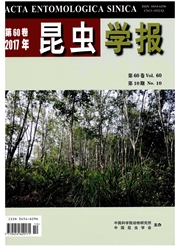

 中文摘要:
中文摘要:
广聚萤叶甲Ophraella communa是入侵性杂草豚草Ambrosia artemisiifolia的一种重要专一性天敌。为探明短时低温胁迫对广聚萤叶甲发育和生殖的影响,将广聚萤叶甲置于2,5,8,11和14℃人工气候箱内(RH 70%±5%,14L:10D)处理2 h,测定卵、幼虫、蛹存活率、发育历期及成虫存活率、寿命、繁殖力。结果表明:2 h低温胁迫后卵的孵化率随着胁迫温度降低而降低,对照(28℃)孵化率为90.7%,而2℃胁迫后卵孵化率最低,仅为72.2%;幼虫存活率受低温胁迫影响显著,2,5,8,11和14℃短时胁迫及对照的存活率分别为40.0%,42.7%,62.7%,72.7%,70.0%和78.0%;2~14℃低温胁迫后,蛹的存活率在88.0%~92.0%之间,与对照(90.7%)无显著差异(P〉0.05);2 h低温胁迫显著缩短成虫寿命,降低了雌虫繁殖力,且对成虫存活影响显著,其存活率随温度的降低而显著降低。经2℃胁迫2 h后,雌虫和雄虫存活率(24 h内)分别为79.0%和51.0%。2~14℃低温胁迫2 h后对广聚萤叶甲各虫态(除蛹以外)影响显著。据此推测,在野外,早春急剧降温是造成广聚萤叶甲种群数量低的一个重要原因。
 英文摘要:
英文摘要:
Ophraella communa LeSage(Coleoptera:Chrysoraelidae) is an important and specific natural enemy of Ambrosia artemisiifolia L.(Asterales:Asteraceae).To understand the effects of short-term low temperature stress on development and fecundity of O.communa,the survival rates and developmental durations of eggs,larvae and pupae,and survival rate,longevity and fecundity of adults of O.communa under short-term(2 h) low-temperature(2,5,8,11,and 14℃) stresses were determined in five environmental chambers(a relative humidity of 70%±5%and a photoperiod of 14L:10D).The results showed that the hatch rate of eggs decreased with the decreasing temperature.The hatch rate of eggs was 90.7%at 28℃(the control),while the lowest hatch rate of eggs(72.2%) was observed in the 2℃-stress treatment.The survival rates of larvae were significantly affected by low-temperature stresses.The larval survival rates were 40.0%,42.7%,62.7%,72.7%,70.0%and 78.0%in 2℃-,5℃-,8℃-,11℃- and 14℃-stress treatments and the non-stress control,respectively.After 2 - 14℃ short-term stresses,the survival rates of pupae was 88.0%-92.0%,which did not differ from that of the control(90.7%)(P0.05).The longevity and fecundity of adults decreased significantly and the survival rate of adult was also significantly affected under low temperature stresses,and the survival rate of adults decreased significantly along with the decreasing temperature.Female and male survival rates were 79.0%and 51.0%after 2℃- stress,respectively.The short-term(2 h) low temperature(2 - 14℃) stresses had significant effects on different developmental stages of O.communa except the pupal stage.It is so inferred that the rapidly dropping temperature may be one of important factors resulting in a low population level of O.communa in early spring in the field.
 同期刊论文项目
同期刊论文项目
 同项目期刊论文
同项目期刊论文
 期刊信息
期刊信息
